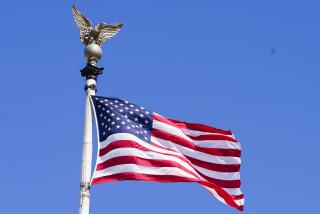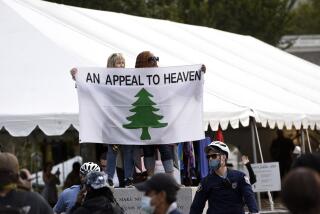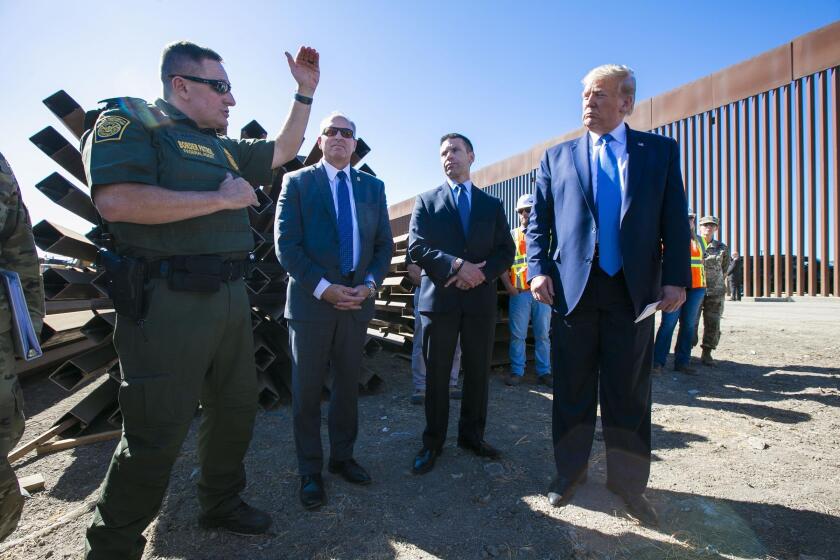Cross on public land in San Diego is unconstitutional, federal court rules
Reporting from San Diego and Los Angeles — The 43-foot cross atop public land on Mt. Soledad in San Diego is an unconstitutional “government endorsement of religion,” a federal appeals court ruled Tuesday, the latest twist in a two-decade legal struggle.
But the U.S. 9th Circuit Court of Appeals did not order the cross removed, as the Jewish War Veterans and other litigants, backed by the American Civil Liberties Union, had hoped.
Instead, a three-judge panel sent the case back to a federal trial judge for “further proceedings” on the issue of whether the cross can be modified to “pass constitutional muster” as a war memorial, wrote Judge M. Margaret McKeown.
Tuesday’s ruling was in response to an appeal from a July 2008 ruling by U.S. District Judge Larry Burns that the cross was part of a war memorial and thus could remain.
The property surrounding the cross has been controlled by the U.S. Department of Defense since 2006, a move that supporters of the cross on the City Council and U.S. House of Representatives thought would protect it from a court ruling that a cross on public property is improper.
In a 56-page opinion, McKeown wrote that “having considered its history, its religious and non-religious uses, its sectarian and secular features, the history of war memorials and dominance of the Cross — we conclude that the Memorial, presently configured and as a whole, primarily conveys a message of government endorsement of religion that violates” the constitutional provision of separation of church and state.
The ruling did not suggest methods in which the Latin cross and surrounding property could be reconfigured.
The cross was first erected in 1913, but the version there now was erected in 1954. In recent years, hundreds of small plaques have been placed on walls at the base of the cross in honor of military veterans of all faiths. But McKeown said that did not change the fact that the cross is primarily a Christian symbol.
Defendants in the case were the city of San Diego, the U.S. government and Secretary of Defense Robert M. Gates.
The practical effect of Tuesday’s decision is that the Mt. Soledad cross will have to be removed from the memorial site unless a full panel of appeals judges reverses the ruling or the Supreme Court accepts review and reverses it, said San Diego City Atty. Jan Goldsmith.
“This is a fundamental victory for freedom of religion in this country,” said David Blair-Loy, legal director of the American Civil Liberties Union of San Diego and Imperial Counties, which litigated the case.
“Most people who drive by every day only see the cross. They don’t see the rest of the site, and for decades the cross stood there by itself,” Blair-Loy said. “People see that as the government endorsing Christianity and preferring it to other religions.”
The cross’ Christian nature alienated veterans of other faiths, including Jewish War Veterans of the United States of America and other non-Christian plaintiffs, who first brought the suit in district court in the 1990s.
The American Center for Law and Justice, a nonprofit public interest law firm based in Washington, D.C., called the decision a “a judicial slap in the face to the countless military veterans honored by the memorial.”
The organization, which focuses on constitutional law and religious freedom, intends to take further action to preserve the iconic cross.
“Historically, war memorials will traditionally have a cross as a reference point because it has taken on this universal symbolism of sacrifice all over the world,” said Jay Sekulow, chief counsel of the American Center for Law and Justice.
“If this decision stands — that every war memorial that has a religious symbol is unconstitutional — it will be really troubling to the supreme courts.”
More to Read
Sign up for Essential California
The most important California stories and recommendations in your inbox every morning.
You may occasionally receive promotional content from the Los Angeles Times.











